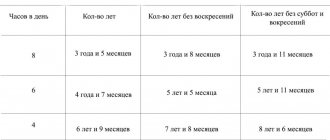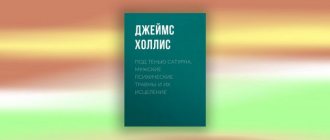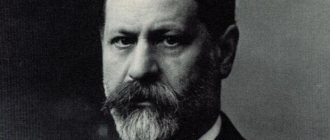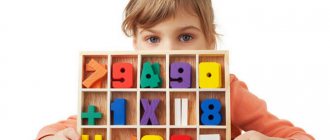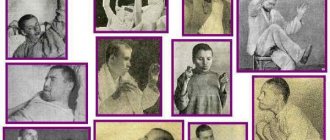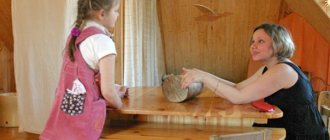“Montessori from the very beginning. From 0 to 3 years” Lynn Lillard Jessen, Paula Polk Lillard
The pedagogical system of Maria Montessori is almost a hundred years old. It is successfully used in many advanced schools and preschool institutions. It is based on a special organization of the child’s environment, aimed at the comprehensive development of his abilities. Particular emphasis is placed on the independence and freedom of the baby within given boundaries.
This book allows you to get acquainted with the main theses of the Montessori method and apply them in practice. I recommend it to all mothers of newborns. In it you will find answers to questions that concern all parents:
- how to organize the space of a children's room;
- what educational toys are suitable for very early ages;
- how best to organize your daily routine;
- How to instill in your baby the first skills of self-care.
In addition, this book will help mothers better understand the emotional language of the baby and establish a strong spiritual connection with him.
Buy the electronic version of the book Buy the printed version of the book
Your child is informal. Parents about youth subcultures
Author: E. Bolshakova
Information about the book:
E. Bolshakova is the author of articles on developmental psychology, education and development of creative abilities of children and adolescents. Member of the Russian Union of Professional Writers.
What to do if your child is completely immersed in informal culture? What exactly are these youth, teenage subcultures?
This book will give answers to these and other questions, tell parents about various mass youth movements, their characteristics and negative features, as well as possible ways to overcome their negative aspects.
Buy a book
“After three it’s too late” Masaru Ibuka
A bestseller that has won the hearts of moms and dads from all over the world. The book tells about the amazing abilities of children under three years old. According to the author, the brain of babies is malleable and plastic, like plasticine. Therefore, they can easily be taught anything. Children learn skills and abilities that are difficult for adults to master easily through play. The main thing is not to miss the moment to develop a specific skill and to immerse the little person in a new experience in time.
In the book you will find simple tips and tricks that will help stimulate your baby to develop. With its help, you will open up incredible prospects and opportunities for your baby. Buy the electronic version on liters Buy the paper version on Labyrinth
Victoria Dmitrieva “Maria Montessori’s Early Development Methodology. From 6 months to 6 years"
A book written specifically for mothers and fathers who not only want their child to grow up successful, developed and self-confident, but are also ready to make efforts for this. Intended for teachers and young parents, it reveals the well-known, repeatedly proven method of Maria Montessori. The author calls for starting to raise children at a very early age, namely at 6 months. In this book on education you will find practical tips, exercises that will help you grow a child into a harmonious, developed personality, and most importantly, do it in such a way that the child is interested in the whole process.
“The most important book for parents” Julia Gippenreiter
This is a collection of the three most popular books by the world famous psychologist Julia Gippenreiter. From them you will learn how to build harmonious relationships with daughters and sons. The author shares the secrets of child psychology, lifting the veil of secrecy over the inner world of little people.
The books are written with great respect and love for little people. They will teach you to communicate with your offspring without shouting, punishment, or ultimatums. The author examines the parenting models that have existed over the past few decades and explains why they should be abandoned.
Buy the electronic version on liters Buy the paper version of the book on Labyrinth
Communicate with the child. How? Julia Gippenreiter
Another book from this author. Julia believes that a child will not be able to develop harmoniously if the relationship between parents does not work out in the family.
This is not the only problem - many fathers and mothers do not know how to communicate with their children. How? - a question to which they are constantly looking for an answer. If you are also worried about this, Gippenreiter’s will tell you how to improve your relationship with the most beloved person in the world - your child.
“Book for parents” Anton Makarenko
Anton Makarenko is an outstanding educator and educator. His teaching merits are recognized by the UNESCO World Heritage Fund. He worked in criminal correctional institutions for juvenile offenders for more than 10 years. There he successfully applied the educational system he created, based on the ideas of humanism and deep faith in man. Most of the people from these institutions were successfully socialized and did not return to the path of lawlessness.
In the book, the author touches on questions that are relevant at all times:
- how to instill in a child kindness, self-esteem, respect for elders;
- how to raise a child to be hardworking and persistent;
- how to build relationships in large families;
- how to avoid the development of childish egoism;
- how to maintain parental authority;
- How to help your child learn to communicate with peers.
Buy the electronic version on liters Buy the paper version on Labyrinth
“Secret support. Attachment in a child’s life” Lyudmila Petranovskaya
This book is about the relationship between parents and their offspring. The author talks about the special role of parental love in personality development. About how important it is for children to grow up in an atmosphere of warmth and trust.
From it you will learn the meaning of children's hysterics, tears, and whims. Learn to deal with them without shouting or punishment. You will help your child develop a basic sense of security and eliminate the need to fight for your love.
Buy the electronic version on liters Buy the paper version on Labyrinth
Books that a psychologist recommends for children to read
On the Internet I accidentally came across a list of books that psychologists recommend for children to read. The list interested me because the books were not just listed, but described what qualities of character and worldview they form or correct in children, what age they are intended for, etc., but I would like to hear the opinions of book lovers and knowledgeable readers. The fact is that for my children: a 7-year-old son and an almost 4-year-old daughter, I read books only before bed, because... at other times they are of little interest in books, that is, our family reads little. I noticed that my son likes books with people in them, but my daughter is only interested in princesses and kittens. :) We’ve read all of Emil, The Wizard of the Emerald City, books about family and a truck (except for the last part about Denmark), now we’re reading Dunno, I’m planning to pick up a book about Pinocchio (we watched the cartoon, but didn’t read the book). We used to love to read about the dog Sonya, about Winnie the Pooh, Aibolit in prose, and the Warranty Men. Both of them didn’t like the mole, Russian folk tales and epics don’t work either (well, except for the kolobok, turnip, tower). It is worth noting that my son is very impressionable and fearful, so I try to smooth out, alter or skip the cruel moments found in books or those related to death, illness. Please share your comments and opinions about this list of books. How did your children react to the books on the list, which ones they liked, which ones you liked, which ones you didn’t like, which ones seemed scary or completely unnecessary, at what age, in your opinion, this or that book is worth reading.
1. Andersen G.K. All his tales have become classics. You should definitely introduce your child to the ugly duckling and his search for himself in life, the girl Gerda from “The Snow Queen,” whose love turned out to be stronger than all obstacles, the Little Mermaid and the little match girl. The last 2 fairy tales are about attitudes towards death. A child develops a fear of death around the age of six. It is around this time that he can be introduced to these fairy tales, permeated with the light sadness of not disappearing, but of another continuation. “Galoshes of Happiness” is equally useful to re-read for both teenagers and their parents - revaluation of values is a cyclical process, similar to putting things in order at home, when outdated trash can be thrown away, and important things can be helped to shine with new facets. 2. Ball G. “Toropun-Karapun and the secrets of my childhood.” A complex, multifaceted and interesting story for primary and secondary school age. 3. Baum F.L. "The Wizard of Oz" and its sequels. This is the American forerunner of our “Wizard of the Emerald City”. But it’s not the same thing, but an independent and psychologically very interesting book, telling about the options for the heroes’ life strategies and the consequences of these strategies. This is a life scenario that is a good idea to provide to your preschooler or elementary school student. 4. Bisette Donald “The Forgotten Birthday” and any of his other books. These are wonderful short and very exciting fairy tales for preschoolers and primary schoolchildren, as well as their parents who have eyes and ears. They very accurately and unobtrusively show various difficult situations into which various small and large creatures find themselves, and some ways out. 5. Volkov A. “The Wizard of the Emerald City.” This is not just a talented retelling of F. Baum, in many ways an independent adventure work that captivates children with the possibilities of achieving the most necessary things, without which life loses its meaning. Preschool and primary school age. 6. Geraskina L.B. "In the land of unlearned lessons." Children are fully mature for its perception by the age of 8-9 years, when the need to personally accomplish something significant arises. This journey has a chance to revive your student’s fading cognitive interest. 7. Dragunsky V. Deniskins and other stories. Including “Twenty years under the bed. The serious is mixed with the funny, making the terrible no longer seem terrible. Remarkably useful for fears. 8. Kestner E. “The Matchbox Boy.” How to live if you are completely different from others, for example, very small? Take advantage of the magic and become like everyone else or remain yourself, which is exactly what is needed in this world. 9. Collodi Carlo “The Adventures of Pinocchio”. The forerunner of our Pinocchio. A fascinating story of the transformation of a growing man. 10. Korczak Janusz “King Matt”. It was Korczak who knew firsthand about the problems of children's self-government and the role of adults in this intricate process, having worked for a long time in an orphanage and sharing the fate of the last day of life with his pupils. 11. Krapivin Vlad. "Flying Tales". There is so much in these stories for a developing person, especially if he is a boy, that it is difficult to overestimate. 12. Carroll L. “Alice in Wonderland.” After 5 years, most children forget the wonders of word creation. This book is for those who are 4-5 years old or adults with the soul of a small child, like Charles Lutwidge Dodgson, the author of Alice, was on his holidays. This book is an extravaganza, a continuous play on words, the kind of verbal gymnastics that is necessary in the formation of a child’s speech and his ability to meet new things not as scary, but interesting. 13. Lagerlöf S. “The Changeling.” It is better for mom to read this fairy tale herself first, because unexpectedly it can awaken strong feelings, accompanied by streams of tears. The children are more likely to be school age. 14. Lagin L.I. "Old Man Hottabych." Here it is - the dream of the coveted freebie. However, not everything is so simple in life. You have to pay for everything. 15. Lingren Astrid. "Tales about Malysh and Karlsson." A wonderful way out for a lonely, bored child. And for his parents, it’s a reason to think about whether it’s worth refuting your child’s fantasies if they replace something extremely important for him. This reminds me of a story that supposedly happened to Socrates. He was once asked whether he should get married. “Be sure to get married,” answered the philosopher. If you get a good wife, you will be happy. If it’s bad, you’ll become a philosopher.” It’s the same with children - if the family is very prosperous, a balanced and harmonious person will grow up without any special prominences in fate. If family life is not very smooth, then it awakens the play of the imagination in order to compensate for emotional shortcomings. This is how many writers and other creative people were born. Astrid herself was forced to create for the first time in childhood by her illness, which confined her to bed for some time. 16. Mamin-Sibiryak D.N. "Alyonushka's Tales". Sleep, Alyonushka, sleep, beauty. And dad will tell you a fairy tale... The main thing is not to cry yourself (this is if no one told you anything like that as a child). This is such a message of parental love that protects the child in any adversity that it is difficult to find an equal. Perhaps in “The Snow Queen”, in the castle of robbers (!), where the old robber smacked her little daughter on the nose so much that her nose swollen and turned blue, but all this was done with love. 17. Maeterlinck Maurice. "Blue bird". The search for happiness - where does it lead? And into the kingdom of dreams and pleasures and into the afterlife. The fairy tale reminds us of where happiness has been all this time, unnoticed by anyone. Read it and remember. 18. Milln A. “Winnie the Pooh and all-all-all.” Dad is telling it again. How do such different creatures manage to coexist, and not just coexist, but also be happy with each other? This is a bestseller on the psychology of family life with thriller elements. Children with fear problems will be very interested to learn about the search for Buka and the catching of the Heffalump, after which the pig Piglet almost finally decided to run away from home and become a sailor. 19. Nosov N. His stories (the “Living Hat” alone is worth it if your little coward reads it) and, of course, the adventures of Dunno. He seems to be a generally negative hero, but he learns from life with pleasure. What more could we wish for our children? 20. Olesha Yu. “Three fat men.” If a child once knew selfless and devoted love, his heart cannot be made iron, except perhaps the arrow of the internal compass. And even then she will turn to where it is warmer. 21. Oster G. His books are on my desk. It’s good to read them together and laugh together at ourselves and our terrible problems. Bad advice works somewhat like the adventures of Baron Munchausen. Laughter disarms any irrational beginning. The danger of harmful advice lies only in parents taking it too seriously. Do not have another one. Pay attention to “Papamalogy”, “Education of Adults”, “The Cannibal Cookbook”, “School of Horror”. However, only parents who themselves have overcome the problems of their children's fears will be able not to aggravate their child's situation, but to help resolve it. Auster's books are a kind of test for parental lice. If books make you feel hostile or afraid, then you have a problem and it makes sense to conduct an audit of your own life before actively shaping the life of your child. Then it’s better for him to have distance in his relationship with you. For the duration of your personal growth, of course. 22. Pogorelsky Anthony “Black chicken or underground inhabitants.” It’s not all Maslenitsa for the cat, says a Russian proverb. The lucky ones and the darlings of fate sooner or later have to face a situation that rudely and painfully confronts them with the fact that in every brilliant achievement there is 1% genius and 99% hard labor. 23. Rawlings Joan. "Harry Potter". Now it’s hard to imagine a children’s bookshelf without it. Moreover, even those who don’t read at all read. This is a literary phenomenon that loses everything when it is disintegrated into atoms by an attempt at analysis. It seems like another interesting fairy tale. I will not try to understand the secret of her success. One thing is clear to me: we, adults, need and can take advantage of the wonderful opportunities for our communication with children and getting to know each other, which this book provides. 24. Twain Mark. "Adventures of Tom Sawyer". This old book has by no means lost its stellar qualities in modern times. Interest in her continues unabated among both girls and boys and can only be compared with the success of Spider-Man. You just grow up with Tom, and you don't need any accompanying morality. The book contains everything in a delicate and acceptable form for any child. 25. Tokmakova I. “Marusya will return again.” Again a fabulous journey in which the girl finds herself again, overcoming her fear and leaving her illness behind. Just like in life. Although the author is unlikely to be familiar with the psychosomatic concept of the origin of diseases. The artist has a tool for intuitive knowledge of life, an alternative to the scientific one. 26. Tolstoy A. “The Golden Key”. He's never too far from you. You just need to tear your seat away from the comfortable seat. Children are always happy to do this. We often don't. The result of the compromise is a mossy aunt Tortila, lying on a chest with someone's golden key of happiness. And the vain search for themselves by those who did not become Pinocchio. Dad Carlo is an example of an excellent parent. 27. Travers P. “Mary Poppins.” No one knew better than her how to return children to reality and at the same time not deprive them of fairy tales. 28. Sharov A. Several wonderful stories during which children grow up unnoticed. These are “The Pea Man and the Simpleton”, “The Cuckoo Little Prince from Our Yard”, “The Adventures of the Hedgehog and Other Drawn Little People”. 29. Ende Michael “The Endless Book”. This is a fascinating story, over which more than one mother shed a lot of tears, because everything is about her, and there’s nothing to say about the child. Only they don’t cry, they just read or listen avidly. If, of course, history coincided with their need to transform their lives (usually about 9 years). This is a magnificent model of child psychotherapy with all its details, and, most importantly, with EXIT - the exit from the land of fantasy into real life. This is not the case in all fairy tales. And there may be a temptation to sit out in the bushes of Fantasyland all your life. Book mania, film mania, drug addiction - just to encounter this uncomfortable world less often. This story really provides the key to unraveling the mystery of human change.
“5 methods of raising children” Mikhail Litvak
The famous psychotherapist shares his views on raising the younger generation. To many they will seem revolutionary and too bold, sometimes categorical. But how else can we draw attention to the problem of the development of a “new” person, adapted to the conditions of modern society?
The author argues that the upbringing of children should begin with the upbringing of their parents. Moreover, long before the planned addition to the family. The book discusses the principles of building a strong and strong family that can raise full-fledged members of society. Recommendations are given on how to behave during the intrauterine development of a child and after birth.
And, of course, it contains a lot of useful information on raising children under 5 years old. The theory is supplemented with practical examples and dialogues. If you want to look at a problem from a different angle and enrich your vision, do not bypass this book.
Buy the electronic version on liters Buy the paper version on Labyrinth
Galina Momot “Everything just begins at three. How to raise a child smart and happy"
The book is intended for parents whose children are already 3 years old. The author also argues that when raising a child, special attention should be paid to support and respect. The book on education teaches that raising a child does not always involve boring lectures, teachings and endless cramming. You will be taught how to turn a lesson into a game that will not only be useful for the child, but also interesting. Also in the book you will find practical tips that will help raise a versatile, developed, but most of all, happy child. The author believes that in the pursuit of success, parents very often forget about what makes their child happy, and this is unacceptable.
“An independent child, or how to become a “lazy mother” Anna Bykova
Book on raising children “An independent child, or how to become a “lazy mother” Anna Bykova
The author of the book is the famous Russian psychologist and blogger Anna Bykova. In her book, she writes about the dangers of overprotection and the importance of developing independence. Many mothers make the same mistake - they surround their sons and daughters with excessive care. It seems to them that by creating the most comfortable conditions for the child, they will make his life easier and protect his fragile psyche.
But in fact, everything is exactly the opposite. The stronger the parental care in childhood, the more difficult it is for a person to adapt to life in society. Anna Bykova substantiates this idea in detail and in an accessible way in her book. She also gives practical recommendations for building parent-child relationships.
Buy the electronic version on liters Buy the paper version on Labyrinth
“How to talk so children will listen, and how to listen so children will talk” Adele Faber, Elaine Mazlish
Reaching mutual understanding with your child can sometimes be very difficult. At some moments you just want to surrender to the mercy of this little monster. A wonderful book by two mothers of many children and part-time relationship experts will come to your aid.
With its help, you can look at the world through the eyes of a little person and understand his illogical actions. You will begin to speak the same language with your baby and finally achieve mutual understanding. It will help you prevent conflicts and teach you how to find compromises.
I also advise you to read our article “What to do if your child does not listen.”
Buy the electronic version on liters Buy the paper version on Labyrinth
“Thirty million words. We develop a baby’s brain by simply talking to him” Dana Susskind
The book was written by a pediatric surgeon who helps hard of hearing children restore their hearing. One day she came across a scientific study on children's intellectual abilities. According to him, children raised in an active speech environment demonstrated better results in learning and development.
Dana Susskind became interested in this research and developed child development programs based on it. They are based on intensive communication with a child under four years old, immersing him in a language environment. Having successfully applied her developments in practice, she presented them in this book.
From it you will learn how to properly organize communication with your offspring so that it is beneficial. How to build a dialogue with a little person, what words to use and which ones to avoid.
Buy the electronic version on liters Buy the paper version on Labyrinth
“The Emotional Intelligence of the Child” John Gottman, Joan Decler
Emotional intelligence is the basis for harmonious interaction between people. Individuals in whom it is poorly developed find it very difficult to contact society. They are unable to recognize other people's emotions due to poorly developed empathy. And they practically don’t own their own.
Unfortunately, the development of emotional intelligence is not given enough attention. But it is he who largely determines a person’s success in life. With the help of this book, parents will be able to lay the foundations of emotional literacy for their child. He will learn from an early age to use his emotions for good. This will give him an undeniable advantage in life and save him from many problems.
Buy the electronic version on liters Buy the paper version on Labyrinth
“Issues of child psychology” Lev Vygotsky
Serious literature for serious parents. Fundamental work of an outstanding Soviet psychologist who laid the foundations of child psychology. If you like serious books written in scientific academic language, then this is just your option. The book is used as a teaching aid for psychologists and teachers in universities throughout Russia.
It examines the main periods of child development, their features, problems, and crises. After reading, you will be able to answer your own burning questions related to parenting.
Buy the electronic version on liters Buy the paper version on Labyrinth
“The secret world of children in the space of the world of adults” Maria Osorina
Unfortunately, as we grow up, we forget what it’s like to be children. Therefore, sometimes it is very difficult for us to understand what is going on in the heads of our little people. What strange rituals, secrets, ideas dominate their world? Why is their behavior sometimes so illogical and incomprehensible?
Maria Osorina lifts the veil of secrecy over the amazing universe of childhood. The book provides answers to burning questions. For example, why do children love to climb through trash cans so much? What is the meaning of children's games? What are they afraid of and why? It is written in a lively and interesting language. After reading, you will certainly want to return to your childhood at least for a short time and remember your favorite pastimes.
Buy the electronic version on liters Buy the paper version on Labyrinth
TOP 10 books on child psychology for parents and teachers
There are tons of useful and interesting books on the Internet, among which it is difficult to find a suitable work. We have compiled into one list books on child psychology for parents and teachers who are constantly busy with work. If you don’t have time to look for books, then you can set aside at least an hour for reading.
When we compiled the selection, we looked at the ratings of books and read reader reviews. The authors answer questions that interest all teachers and parents - how to find an approach to a teenager, why talented students are not always a joy, how a teacher can keep his nerves at work and why communicate with your child every day.
1. Peter Gray “Freedom to Learn. Game against school"
The author works as a psychologist and considers traditional school a failed idea. The best method for children to learn is play. Peter Gray suggests giving the child the freedom to explore interests so that the child can quickly integrate into an ever-changing world. He advises not to divide children into age groups, but to allow them to play and learn on their own without adult supervision.
Gray is sure that independence is exactly what a modern child lacks. Even the best books on child psychology may give controversial and ambiguous advice, but they provide plenty of reasons to think.
2. Doug Lemov “The Mastery of the Teacher. Proven methods of outstanding teachers”
American teacher Doug Lemov is confident that teachers do the most important and most difficult work in the world. An effective teacher is a master who has worked hard and paid attention to hundreds of details. This is the art that all teachers dream of mastering.
Doug Lemov is also a scientist who created a system of 49 techniques. These methods help determine the success of the teacher and his students. To do this, the author attended thousands of lessons from qualified teachers from regular schools. Domestic teachers agree that this book is useful. But many teachers admit that not all methods can be applied in our conditions.
3. Nina Jackson “ Cool teacher.” How to work with difficult students, difficult parents and enjoy the profession"
The topic of child psychology and books for psychologists are of interest to both parents and teachers. Nina Jackson is a renowned British teacher and international education consultant. Her book provides answers to teachers' most difficult questions.
Conservative colleagues argue over new teaching methods, children do not want to learn, and parents consider him a useless employee - a separate chapter is dedicated to each problem. Among the pressing topics is how to properly build work and relationships with a child who has dyslexia, ADD or autism.
The author has compiled a collection of techniques and tips that help her colleagues work and enjoy it. Nina Jackson notes the importance of regular hugs, listening to music in class and useful mobile applications that help with work.
4. Anthony Wolfe “Child or Monster? How to be a parent of a modern teenager”
Books on child psychology and parenting, in particular the work of Anthony Wolfe, give the answer to how to communicate with a teenager and think sensibly at the same time. Any person thinks rationally, like an adult, and sometimes succumbs to the whims of the inner child. Just a teenager has not yet learned to contain the “child” inside himself, but wants to look like an adult. And adults themselves often turn into unrestrained “children” when they communicate with a teenager.
The author believes that the task of teachers and parents is to correctly build a dialogue with a growing person. We need to leave room for the “child” and help show adult qualities. Anthony Wolfe answers how to create a good relationship with a teenager and help you enter adulthood correctly.
5. Judy Apps “ To be listened to and heard”
A guide for those who talk a lot at work. The author says that the voice is a unique instrument in which amazing possibilities are hidden. You can learn to use it to be successful. The voice conveys emotions, it can change in time for some situation and helps to capture the attention of an audience of millions or a group of 10 people.
Judy Apps explains what famous speakers do and how to successfully speak in front of an audience, especially children. This is one of the best books on child psychology and education. It describes exercises so that you can practice proper breathing, voice timbre, intonation and articulation. The last chapter gives valuable advice on how to be less tired when you have to talk a lot.
6. Robert J. Mackenzie “Stubborn Child. How to set boundaries of what is permitted”
An American psychologist decided to write a book about stubborn children when he himself became the father of such a child. Books about child psychology say that stubbornness is visible from early childhood - it is revealed by temperament. The author supports this idea and says that stubborn children are often persistent, hyperactive and distracted.
Don't be so quick to consider yourself an incompetent parent. Robert McKenzie will tell you how to properly motivate a stubborn person, how to speak and negotiate.
7. John Gottman “Emotional Intelligence”
Parents want the best, but often do the wrong thing. If you want to raise a healthy child, then do not punish him for any fear or sadness. It turns out that you were preparing your child to cope with any difficulties, but he will not be ready to solve the slightest problems along the way. After all, he was reprimanded for “wrong” emotions. Books on child psychology for teachers tell how to communicate with a child, but rarely teach this to the parents themselves.
Psychologist John Gottman explores the topic of emotional education and how parents build a dialogue with their child during emotional moments. Conversations like these influence how successful and happy your children will be in the future. The author tells how to teach children to distinguish emotions and control feelings.
8. Olivier Revol “It’s okay: academic failure is curable!”
The topic of child psychology and a book for teachers can explain to education workers that children can be afraid of school and therefore skip it. Olivier Revol explains that the child may have his own reason. It is the parents who must take action when the child does not want to talk about school, is very afraid, or writes badly. It's not just lazy people or truants who don't want to go to school.
The author is a psychiatrist and explores the topic of child failure from a medical point of view. Olivier Revol spoke for many years with teachers and parents of children who suffered from school phobia. The book is a painful, personal experience.
9. Julia Gippenreiter “ The Miracles of Active Listening”
When a child is offended or upset, the main thing a parent should do is make it clear that his feelings are important to you. There will be few questions “Why are you crying?” or “What happened?” In her next book, Julia Gippenreiter explains how to talk to upset children so that they feel your care and attention. In this matter, every little thing is important - even how you stand or sit and with what intonation you speak.
10. Julie Lythcott-Haims “Let them go. How to prepare children for adulthood"
Listening to your child and showing care is important, but you can't overdo it. Overprotection has never made anyone feel good. The work is included in the list of top books on child psychology. The author talks about anxious parents, whom he calls “helicopters” - because they circle and hover over their children. Julie Lythcott-Haims shares tips on how to stop overprotection and why you shouldn’t behave this way so that your child doesn’t grow up helpless.
Share with friends:
Also read:
Popular books of September 2020: what is the world reading?
TOP 10 books for May 2019
What books are they reading during quarantine?
The most interesting book releases of September 2020
TOP 5 books on the psychology of relationships between men and women
“Let them go. How to prepare children for adulthood" Julie Lythcott-Haims
This book is written for parents who cannot come to terms with the fact that their offspring are growing up. It talks about the harm of overprotection, about the reasons that prevent parents from letting their children go, about the stages of growing up.
The author will share tips on how to help a child become an independent, mature and full-fledged person. And also how parents can cope with fears associated with losing control over the lives of their offspring.
Buy the electronic version on liters Buy the paper version on Labyrinth
Books by psychologists on raising children: list
The top 10 bestselling books about parenting, written by psychologists, tell about the main stages in development. Some of these books, written in the USSR, were banned and inaccessible to many young families.
Psychologists talk not only about the general areas of children’s lives, but also about gender and sexual development, religious (in Islam and Orthodox Christianity), environmental and artistic-patriotic education. All this is important for the formation of a developed personality.
- D. Gray “Children from Heaven.” The book will help you cope with your fears;
- G. Chapman “Five ways to a child’s heart.” The author is not only a children's psychologist, but also a family psychologist, so the book will help build the right relationships in the family;
- J. Ledloff “How to raise a happy child.” How to educate? In the manual you will find the answer to this question, so parents, educators and teachers will like it;
- B. and L. Nikitin “We and our children.” Parents of seven offspring talk about their special technique;
- M. Montessori “The Absorbing Mind of the Child.” In this book, Montessori shares his experiences of parenting;
Books by psychologists on raising children: list
- Sh. Feldcher, S. Lieberman “400 ways to keep a child from 2 to 8 years old.” Suitable for inexperienced and young parents who cannot cope with the activity of their children;
- J. Korczak “How to love a child?” This book by a famous Polish teacher cannot be recommended to a certain category of people - every parent should read it;
- O. Makhovskaya “100 parenting mistakes that are easy to avoid”;
- J. Van't Hal "Creative Education";
- Vladimir Levi “A non-standard child, or How to raise parents.”
